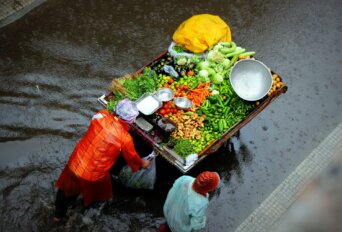- About
- Topics
- Picks
- Audio
- Story
- In-Depth
- Opinion
- News
- Donate
- Signup for our newsletterOur Editors' Best Picks.Send
Read, Debate: Engage.
| topic: | Transparency and Corruption |
|---|---|
| located: | Pakistan, Afghanistan |
| editor: | Shadi Khan Saif |
Food charity, whether in times of disasters or in regular support programs, is just a momentary relief rather than a sustainable solution to the challenges stemming from deep-rooted inequalities. Yet, many in power seem not to understand or ignore its long-term ineffectualness.
As floods continue to wreak havoc across Afghanistan and Pakistan, the authorities continue to boast about dispatching food for the needy. They make sure to take their camera crew with them to the nearby areas of devastation to capture some shots of them generously handing out meal packets to the uprooted men, women and children in a dreadful show of their superiority and the victims’ hopelessness.
First of all, the authorities in power should have performed their duties to minimise the likelihood of such calamities through efforts to reduce greenhouse gas emissions and deforestation rates. Secondly, the authorities were duty-bound to put in place measures to minimise the losses of lives and property by issuing early warnings and relocation notices, rather than exploiting the vulnerabilities of the flood-victims for their own publicity stunts.
The state machinery, which thrives on the hard work and resources of the people, has sadly evolved into a monstrous master that rules over the masses in these countries rather than serving them according to their needs and wishes.
Another example, out of so many, is the absolute lack of a concept of minimum wage standards. The Pakistani government, when under pressure from international lenders, raises taxes on items of basic need overnight without any hesitation or implementation problems. However, when it comes to guaranteeing a basic income for millions of the country’s labourers, there is a clear display of disregard.
A more human, logical and simple way of dealing with these issues could be tying the minimum salary with the foreign exchange rate, the same way as fuel prices are, so that the poor can adjust to the frequent hikes in taxes on petroleum products.
The lack of minimum wage standards leads to the exploitation of workers and the tarnishing of human dignity at extreme levels, making the vicious cycle of begging for food a norm and food charity a noble thing to do.
Throughout the past many years of economic downfall in Pakistan, have the rich and powerful suffered similar blows as those in the middle and lower classes? Of course not, because they hold tightly onto power and can manoeuvre around these shocks, taking advantage of the early warnings at their disposal, while they let the poor beg for food after their homes flood.
Photo by Milind Ruparel

